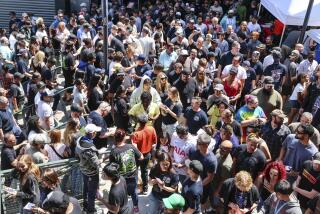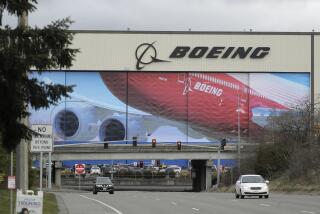Almost Down to Last Strike
- Share via
CHICAGO — The uneven pace of labor talks could quicken again if the Major League Baseball Players Assn. sets a strike deadline as expected today, potentially spurring the sides to address core economic issues and complete an agreement before the sport’s ninth work stoppage begins.
The union’s executive board will meet here after negotiators made little headway in weekend collective bargaining discussions, failing to accomplish enough to persuade players to return to the table instead of planning a possible walkout. Owners and players, although making progress on ancillary matters, have not bridged gaps on revenue sharing and the contentious issue of a payroll tax. They have mostly talked around the two items that might prevent them from reaching a deal.
“I know everyone’s been reading about negotiations being all positive and going great, and some things have moved quickly, but that’s not totally right overall,” said catcher Paul Lo Duca, the Dodger player representative. “The two big issues are still revenue sharing and the luxury tax, and those aren’t exactly moving real fast. It’s more like a snail’s pace right now.”
The big issues, avoided for weeks, were raised in a three-hour bargaining session Sunday. Negotiations are scheduled to resume Tuesday in New York.
Owners have said they would not initiate a work stoppage this season, vowing not to lock out players through the World Series, but could unilaterally implement new work rules after the postseason if negotiations continue to lag. That possibility is expected to prompt the union to play its main bargaining chip. The union is likely to set a strike date of Sept. 1 or Sept. 16 in a meeting attended by player representatives of all 30 clubs, putting an industry that last year generated a record $3.55 billion in revenue on the verge of another shutdown.
The union last set a strike date July 28, 1994, triggering a work stoppage that lasted 232 days and wiped out the playoffs and World Series. The owners implemented, but a federal judge found owners guilty of illegal labor practice, prompting players to return to work.
“If you don’t have any deadline for something to get done, you’ll take your sweet old time to get it done,” said pitcher Scott Schoeneweis, the Angel representative. “That’s true with everything in life. If you need to pay a bill by Aug. 15, or you can pay it whenever, you’ll wait to pay the bill until you actually feel like it.”
Players said they hope setting a date would not adversely affect negotiations characterized by a civility and sincerity absent in previous labor talks, but they feel compelled to consider taking the risky step that could result in a backlash against them by fans. Owners have downplayed the significance of the union’s probable action, maintaining their optimistic tone about talks.
But setting a timer on the process would turn up the heat.
“Quite frankly, Monday is nothing but a date that the union picked for a meeting, and I can only feel so much pressure as a result of that,” said Rob Manfred, baseball’s lead labor lawyer. “It has significance only because [union chief] Don [Fehr] has scheduled a meeting that day, and I just can’t try to get an agreement around that schedule. As far as I’m concerned, it’s just another day that they’re not going to be able to be at the bargaining table.
“This strike date issue is an internal union matter. I just have no way to predict what their dynamics are on that issue. It’s really based on the [union’s] evaluation of how they see the process, as opposed to how we see the process. We are having the kind of discussions that you would hope, if people stick with it, would eventually produce an agreement in the foreseeable future.”
Negotiations have at times moved steadily since resuming in earnest after the All-Star break. Agreements have been reached on minor issues such as increasing the minimum salary to $300,000 starting next year, and the sides are moving closer to finalizing a plan for steroid testing after the union made a major policy shift in ending its long-standing opposition to mandatory drug testing.
However, clearing those hurdles is not enough.
“We had the last year and a half to get this done,” Dodger second baseman Mark Grudzielanek said. “Now, time is a limited resource.”
*
Times staff writer Bill Shaikin contributed to this report.
More to Read
Go beyond the scoreboard
Get the latest on L.A.'s teams in the daily Sports Report newsletter.
You may occasionally receive promotional content from the Los Angeles Times.










